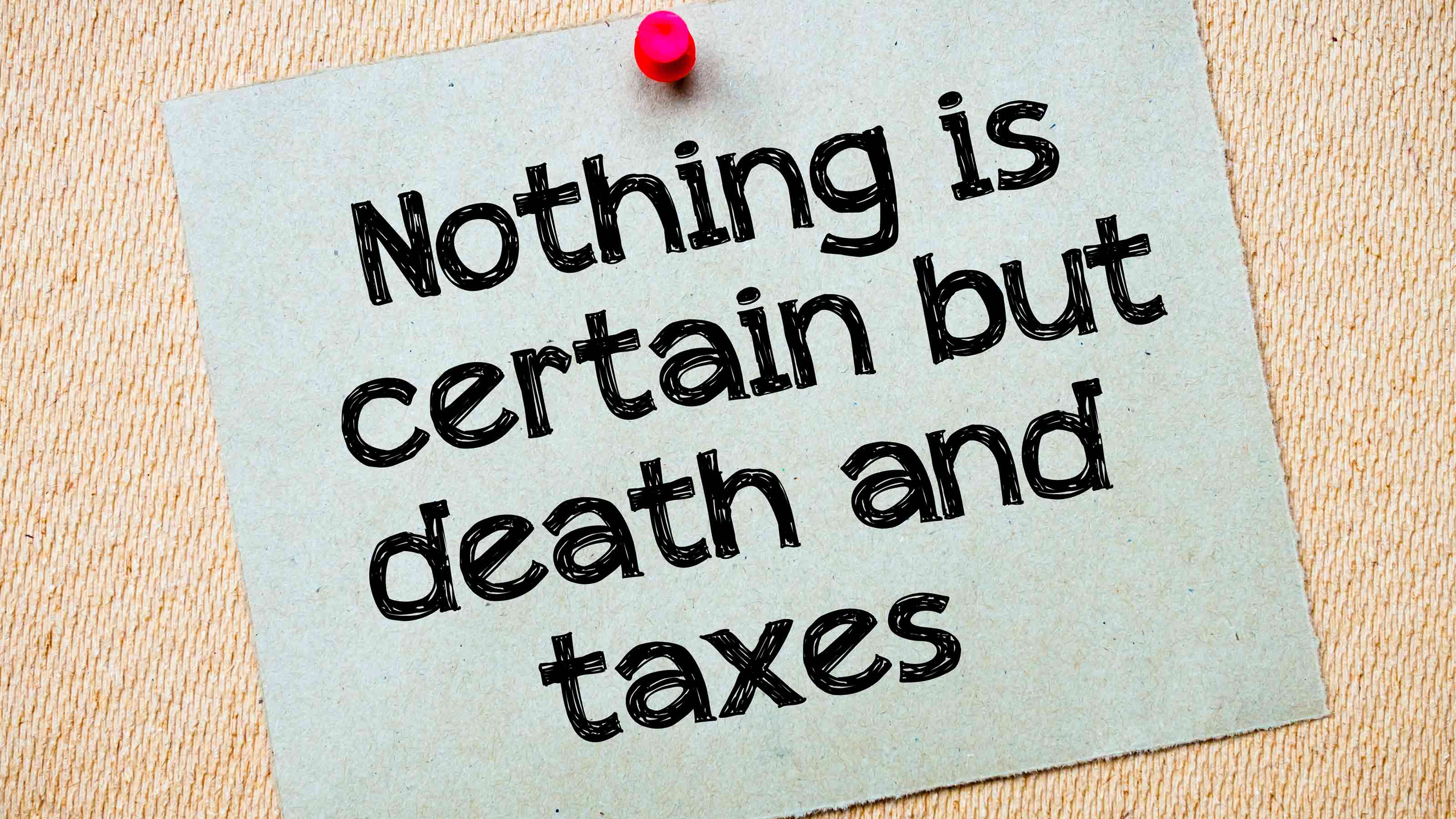Biden's Plans to Impose an Income Tax on Death
The president has proposed a new taxing regime that would make death an income tax realization event for wealthy decedents.


Profit and prosper with the best of Kiplinger's advice on investing, taxes, retirement, personal finance and much more. Delivered daily. Enter your email in the box and click Sign Me Up.
You are now subscribed
Your newsletter sign-up was successful
Want to add more newsletters?

Delivered daily
Kiplinger Today
Profit and prosper with the best of Kiplinger's advice on investing, taxes, retirement, personal finance and much more delivered daily. Smart money moves start here.

Sent five days a week
Kiplinger A Step Ahead
Get practical help to make better financial decisions in your everyday life, from spending to savings on top deals.

Delivered daily
Kiplinger Closing Bell
Get today's biggest financial and investing headlines delivered to your inbox every day the U.S. stock market is open.

Sent twice a week
Kiplinger Adviser Intel
Financial pros across the country share best practices and fresh tactics to preserve and grow your wealth.

Delivered weekly
Kiplinger Tax Tips
Trim your federal and state tax bills with practical tax-planning and tax-cutting strategies.

Sent twice a week
Kiplinger Retirement Tips
Your twice-a-week guide to planning and enjoying a financially secure and richly rewarding retirement

Sent bimonthly.
Kiplinger Adviser Angle
Insights for advisers, wealth managers and other financial professionals.

Sent twice a week
Kiplinger Investing Weekly
Your twice-a-week roundup of promising stocks, funds, companies and industries you should consider, ones you should avoid, and why.

Sent weekly for six weeks
Kiplinger Invest for Retirement
Your step-by-step six-part series on how to invest for retirement, from devising a successful strategy to exactly which investments to choose.
Getting the right tax advice and tips is vital in the complex tax world we live in. The Kiplinger Tax Letter helps you stay right on the money with the latest news and forecasts, with insight from our highly experienced team (Get a free issue of The Kiplinger Tax Letter or subscribe). You can only get the full array of advice by subscribing to the Tax Letter, but we will regularly feature snippets from it online, and here is one of those samples…
President Biden has lots of tax proposals. They are dead on arrival in an election year. However, taxes will be a top issue in 2025.
Biden is starting to lay the groundwork ahead of a looming fight on the fate of the tax changes in former President Trump’s 2017 tax reform law, many of which will expire at the end of next year. We’ll look at one of Biden’s thorniest ideas.
From just $107.88 $24.99 for Kiplinger Personal Finance
Become a smarter, better informed investor. Subscribe from just $107.88 $24.99, plus get up to 4 Special Issues

Sign up for Kiplinger’s Free Newsletters
Profit and prosper with the best of expert advice on investing, taxes, retirement, personal finance and more - straight to your e-mail.
Profit and prosper with the best of expert advice - straight to your e-mail.
Currently, a decedent’s unrealized gains aren’t hit with income tax at death, and heirs get a step-up in basis in inherited assets equal to fair market value. Biden wants to end the effects of the stepped-up basis for wealthy individuals. His proposal generally doesn’t adopt carryover basis, by which the heir would take the same federal tax basis in the inherited assets as the decedent.
It would instead treat death as a realization event for income tax purposes — essentially a deemed taxable sale of the decedent’s capital assets at fair market value, with capital gains and losses reported on the decedent’s final income tax return. The heirs would continue to get a fair-market-value basis in assets they receive. Gifts would also be treated as a realization event for income tax purposes.
Unlike the current law, the donees would take a fair market value in gifted property. There is a $5 million lifetime gain exclusion. Plus other exceptions:
- Property left to a surviving spouse wouldn’t be taxed until that spouse’s death, but the spouse would take a carryover basis in those assets.
- Charitable donations would be exempt.
- Family-owned businesses would escape tax if the heirs run them.
- The existing gain exclusion of $250,000 (or $500,000) on sales of primary residences would continue to apply.
- Gain on tangible personal property left to heirs, such as household furnishings and personal effects, would be exempt from the regime.
- Also, heirs can opt to pay the decedent’s income tax over 15 years on nonliquid assets.
Let’s illustrate the current rules and Biden’s proposal with a simple example: When Amy’s dad dies, she inherits stock that her dad bought years ago for $300,000 that is now worth $7 million.
Under current law, the $6.7 million stock appreciation isn’t subject to income tax, and Amy takes a $7 million tax basis in the shares. Six years later, Amy sells the stock for $7.5 million. Amy pays tax in the year of sale on her $500,000 gain.
Under Biden’s proposal, the stock would be deemed sold upon the dad’s death. Assuming he hadn’t used up any of his $5 million exclusion, the dad’s final federal income tax return would reflect a gain of $1.7 million ($6.7 million minus the $5 million exclusion) and would show tax due from the deemed sale.
Biden also calls for nearly doubling the capital gains tax for upper-incomers by taxing gains as ordinary income to the extent taxable income exceeds $1 million. His realization regime detailed above would act as a backstop so that taxpayers subject to high tax rates while alive wouldn’t hold onto assets until death to escape tax.
This first appeared in The Kiplinger Tax Letter. It helps you navigate the complex world of tax by keeping you up-to-date on new and pending changes in tax laws, providing tips to lower your business and personal taxes, and forecasting what the White House and Congress might do with taxes. Get a free issue of The Kiplinger Tax Letter or subscribe.
Profit and prosper with the best of Kiplinger's advice on investing, taxes, retirement, personal finance and much more. Delivered daily. Enter your email in the box and click Sign Me Up.

Joy is an experienced CPA and tax attorney with an L.L.M. in Taxation from New York University School of Law. After many years working for big law and accounting firms, Joy saw the light and now puts her education, legal experience and in-depth knowledge of federal tax law to use writing for Kiplinger. She writes and edits The Kiplinger Tax Letter and contributes federal tax and retirement stories to kiplinger.com and Kiplinger’s Retirement Report. Her articles have been picked up by the Washington Post and other media outlets. Joy has also appeared as a tax expert in newspapers, on television and on radio discussing federal tax developments.
-
 Quiz: Do You Know How to Avoid the "Medigap Trap?"
Quiz: Do You Know How to Avoid the "Medigap Trap?"Quiz Test your basic knowledge of the "Medigap Trap" in our quick quiz.
-
 5 Top Tax-Efficient Mutual Funds for Smarter Investing
5 Top Tax-Efficient Mutual Funds for Smarter InvestingMutual funds are many things, but "tax-friendly" usually isn't one of them. These are the exceptions.
-
 AI Sparks Existential Crisis for Software Stocks
AI Sparks Existential Crisis for Software StocksThe Kiplinger Letter Fears that SaaS subscription software could be rendered obsolete by artificial intelligence make investors jittery.
-
 Trump Reshapes Foreign Policy
Trump Reshapes Foreign PolicyThe Kiplinger Letter The President starts the new year by putting allies and adversaries on notice.
-
 Congress Set for Busy Winter
Congress Set for Busy WinterThe Kiplinger Letter The Letter editors review the bills Congress will decide on this year. The government funding bill is paramount, but other issues vie for lawmakers’ attention.
-
 The Kiplinger Letter's 10 Forecasts for 2026
The Kiplinger Letter's 10 Forecasts for 2026The Kiplinger Letter Here are some of the biggest events and trends in economics, politics and tech that will shape the new year.
-
 Special Report: The Future of American Politics
Special Report: The Future of American PoliticsThe Kiplinger Letter Kiplinger assesses the political trends and challenges that will define the next decade.
-
 What Services Are Open During the Government Shutdown?
What Services Are Open During the Government Shutdown?The Kiplinger Letter As the shutdown drags on, many basic federal services will increasingly be affected.
-
 Banks Are Sounding the Alarm About Stablecoins
Banks Are Sounding the Alarm About StablecoinsThe Kiplinger Letter The banking industry says stablecoins could have a negative impact on lending.
-
 Trump's Economic Intervention
Trump's Economic InterventionThe Kiplinger Letter What to Make of Washington's Increasingly Hands-On Approach to Big Business
-
 What is AI Worth to the Economy?
What is AI Worth to the Economy?The Letter Spending on AI is already boosting GDP, but will the massive outlays being poured into the technology deliver faster economic growth in the long run?